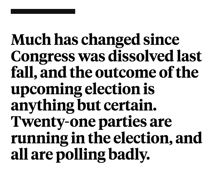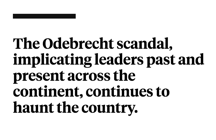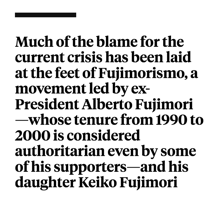
(above) People demonstrate in Lima on Oct. 3, 2019, after President Martin Vizcarra dissolved Peru's unicameral parliament. CRIS BOURONCLE/AFP via Getty Images
Peru’s Vote for a New Congress Could Shape the President’s Legacy
January 24, 2020 - Original article: foreignpolicy.com
After suspending the country’s Congress last fall, new legislative elections could give Martín Vizcarra the support he needs to confront corruption—or lead to renewed political gridlock.
By Joe Parkin Daniels
LIMA, Peru—Peru spent the last few months of 2019 facing a constitutional crisis, but some in the Andean nation remain optimistic that the turbulence in the halls of power could ultimately provide a shot in the arm for the president’s anti-corruption efforts. Following months of steadfast opposition from the unicameral Congress and an effort to unseat him, President Martín Vizcarra dissolved the legislative body altogether at the end of September, which then turned around and suspended him. Vizcarra, who with public and military backing remained the country’s de facto leader, called legislative elections, to be held on Jan. 26, to solve the impasse.
Meanwhile, Peru’s top court ruled last week that Vizcarra’s closure of Congress was legal.
At the time, much of the public applauded Vizcarra’s move, and Peruvians have been consistently in favor of the president’s anti-corruption efforts. Unlike a number of protests that emerged in other Latin American countries late last year, including Chile and Colombia, protests after the closure ended quickly.
Since he assumed office in 2018, many of Vizcarra’s popular reforms have been blocked by the hard-line Popular Force party, which held a majority in Congress until its dissolution. “What happened in Congress underscores the shamelessness to which the legislative majority has fallen,” Vizcarra said at the time, taking particular umbrage at the opposition’s attempts to install judges to the court that would ultimately decide how the impasse is settled. “Peruvian people, we have done all we could.”
 However, much has changed since Congress was dissolved last fall, and the outcome of the upcoming election is anything but certain. Twenty-one parties are running in the election, and all are polling badly. Furthermore, a significant number of voters have signaled their intent to submit blank ballots. Yet the consensus of observers is that centrists seem likely to come out best, and if enough legislators continue to support Vizcarra’s anti-corruption drive, the president could make a significant impact before the next election in 2021.
However, much has changed since Congress was dissolved last fall, and the outcome of the upcoming election is anything but certain. Twenty-one parties are running in the election, and all are polling badly. Furthermore, a significant number of voters have signaled their intent to submit blank ballots. Yet the consensus of observers is that centrists seem likely to come out best, and if enough legislators continue to support Vizcarra’s anti-corruption drive, the president could make a significant impact before the next election in 2021.
The political crisis briefly impacted markets, though the Peruvian sol, the stock market, and bonds swiftly recovered. While police blocked roads and demonstrators took to the streets following the declaration that Congress would be dissolved, Lima quickly returned to relative calm, despite the continuing political disarray. “There’s always one crisis or another,” one news agent in Lima’s historic center said just a few weeks after the dissolution of Congress. “But we just get on with our lives.”
The consensus is that January’s legislative elections should resolve the impasse, though the resolution will only last as long as the newly elected legislature resists the same battle stance against the executive that caused the current crisis. “Both powers must be aware that their collaborative work is what will take the country out of the lethargy in which it seems to have sunk,” said Josef Zielinski, a professor of political science at the University of Lima.
The crisis has galvanized political movements fed up with the constitutional hardball played by opposition legislators and renewed calls to end cronyism and corruption in Peruvian politics, most recently during the Odebrecht scandal. Vizcarra’s anti-corruption drives are what initially earned him support, and his decision to shut down Congress is also popular.
Peru has been no stranger in recent years to political intrigue. The Odebrecht scandal, implicating leaders past and present across the continent, continues to haunt the country.
 Alan García—who twice served as Peru’s president—killed himself in April 2019 as police officers were preparing to arrest him as part of the sprawling international investigation.
Alan García—who twice served as Peru’s president—killed himself in April 2019 as police officers were preparing to arrest him as part of the sprawling international investigation.
Vizcarra himself was unelected, getting the job after serving as vice president to Pedro Pablo Kuczynski, who was also embroiled in the Odebrecht scandal and survived an impeachment vote in December 2017 only to resign three months later after videos surfaced showing alleged attempts at vote buying by allies.
With such sustained turbulence, faith in institutions is weak. Transparency International ranked Peru 101st out of 180 countries in its 2019 corruption index. Vizcarra, who assumed the presidency as a relative outsider, remains popular. He swiftly pursued an anti-graft drive that won him widespread support, with polls suggesting he is one of Peru’s most popular recent leaders.
“But such support is volatile and is limited by a state that has proved ineffective in facing the country’s social agenda,” said Ivan Lanegra, a professor of political science at the Pontifical Catholic University of Peru and the University of the Pacific. “There is some optimism in the citizens about the opportunities for improvement that have opened up with the crisis.”
Much of the blame for the current crisis has been laid at the feet of Fujimorismo, a movement led by ex-President Alberto Fujimori—whose tenure from 1990 to 2000 is considered authoritarian even by some of his supporters—and his daughter Keiko Fujimori, a controversial and recurrent presidential candidate and politician.

“The crisis was generated by the attitude of the Fujimoristas who don’t know how to fulfill their roles as legislators when they are more used to being in the executive branch,” said Eliana Carlin, a prominent anti-Fujimori activist in Lima.
Keiko Fujimori now dominates the movement. She remains the public face and founder of the Popular Force party, despite her preventative arrest in 2018 pending an investigation into corruption within the party and her alleged role in the Odebrecht scandal, having previously come close to winning the presidency in 2011 and 2016.
In November 2019, she was released after more than a year in pretrial detention. Yet while Fujimorismo may be on the ropes, it is far from down and out. Although the Popular Force party is expected to lose seats in Congress, it will remain influential.
A major risk, analysts warn, is that a lack of political leadership after this election could lead to the emergence of another populist president. Beyond Vizcarra, who is limited to serving only one term, few politicians appear ready to galvanize broad support. “And that’s dangerous,” said Jo-Marie Burt, an analyst at the Washington Office on Latin America. “The left is weak, Vizcarra occupies a space in the center, but after that where is the leadership?”
Joe Parkin Daniels is a freelance journalist based in Bogotá, Colombia. Twitter: @joeparkdan